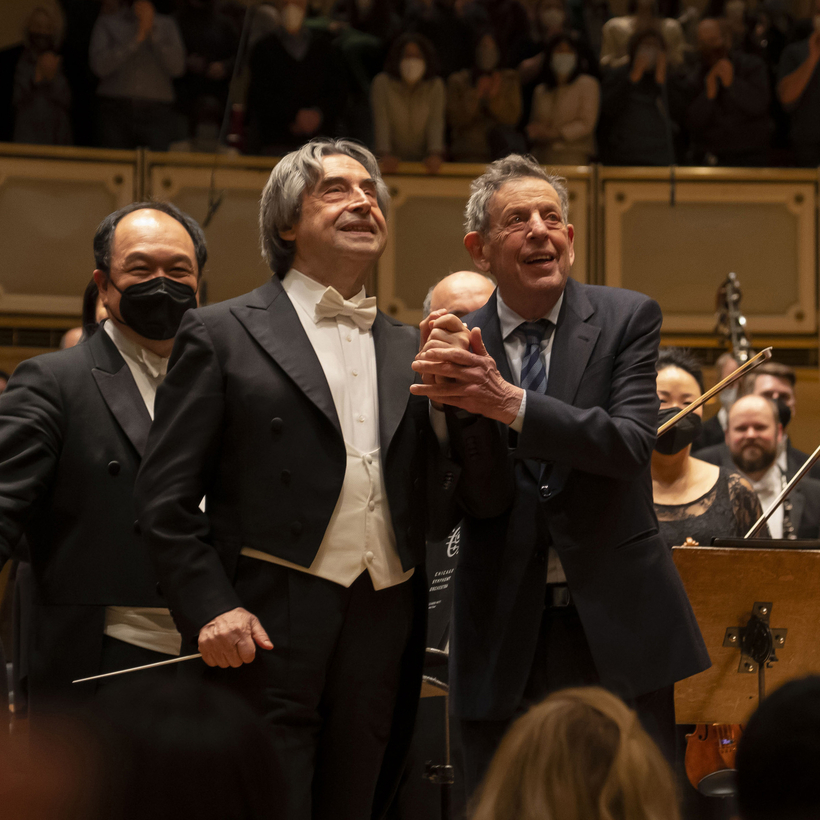Here’s a novelty few can have seen coming: The Triumph of the Octagon, by Philip Glass, dashed off for the Chicago Symphony Orchestra under Riccardo Muti, who this season assumes the title of music director emeritus for life. Yet here it is, heading up an Italian-themed program to be heard on the musicians’ home stage, in the Windy City, from September 28 through 30 and at Carnegie Hall on October 5.
The octagon of Glass’s title refers to the World Heritage site Castel del Monte, a hilltop citadel on the heel of the boot of Italy, built by the 13th-century Holy Roman Emperor Frederick II. With its esoteric, numerological aura, the place has always drawn Muti like a magnet. He grew up nearby and now owns adjoining properties, enjoying privileged access. And Federico Secondo, a scion of the Hohenstaufen dynasty known in his time as stupor mundi, or “wonder of the world,” stands tall among Muti’s supreme culture heroes. A framed photograph of Castel del Monte hangs in his dressing room.

The Glass-Muti association began in February 2022, when the maestro, then 80, and his Chicago ensemble took up Glass’s Symphony No. 11. The lush, adventurous score had premiered at Carnegie Hall on January 31, 2017, the composer’s 80th birthday, when it was performed by his longtime champions Dennis Russell Davies and the Bruckner Orchester Linz. Muti and the Chicago players, on the other hand, were dipping their collective toe into the Sea of Glass for the very first time.
Given the Chicago forces’ éclat, that debut surely ranks as a red-letter day in the composer’s performance history. Even so, his office had made it clear that he could not attend. Yet, on the evening, there he was to witness for himself Muti’s magisterial interpretation and the subsequent standing ovation from the orchestra’s characteristically staid subscriber base. Before Glass left town, Muti had requested, and Glass had promised, a new piece for the orchestra’s very next season.

At 86, Glass husbands his writing time more jealously than ever, so for intel on the genesis and content of The Triumph of the Octagon, we turned to Richard Guérin, the Glass office’s head of repertoire. To start, I asked whether the eight-sidedness of Castel del Monte was in any way encoded in the boss’s new score.
“The subject of Castel del Monte is interesting to me,” Guérin said, “because I know well Nino Rota’s piece by that name, which I assume Muti, who was Rota’s protégé, knows, too. As far as I’m aware, the only ‘encoding’ of the number eight is that it’s written for oboe, clarinet, flute, harp, violins, viola, celli, and bass—technically, that’s eight ‘parts.’”
Why those forces? “After Symphony No. 11, everybody wanted there to be a custom-made new piece for Muti and the C.S.O. to play, even if it had to be on short notice. The initial idea was to write an adagio for Muti, a short piece that the Chicago Symphony could put on a touring program. This was understood to be for Muti’s ‘final season as music director.’ Little did we know that the ‘Muti farewell’—a phrase he says he hates—was going to last for years. But it’s just as well because now the piece is done. It’s the way Philip has always operated: he meets great people and ‘tries to build a bridge towards the unknown.’”
And how did the commission come about? “You were there at Orchestra Hall,” Guérin said. “At intermission I stepped away to check messages, and then I find Philip with Muti’s artistic administrator, Cristina Rocca, who informs me, ‘Great news! Philip has agreed to write a piece for us!’ I literally cannot leave him alone for a second.”
“Muti, Glass & Mendelssohn Italian” will be on at the Chicago Symphony Orchestra from September 28 through 30 and at Carnegie Hall on October 5
Check out AIR MAIL’s Arts Intel Report, our newly revamped research tool for what to do and where and when to do it
Matthew Gurewitsch writes about opera and classical music for AIR MAIL.He lives in Hawaii


